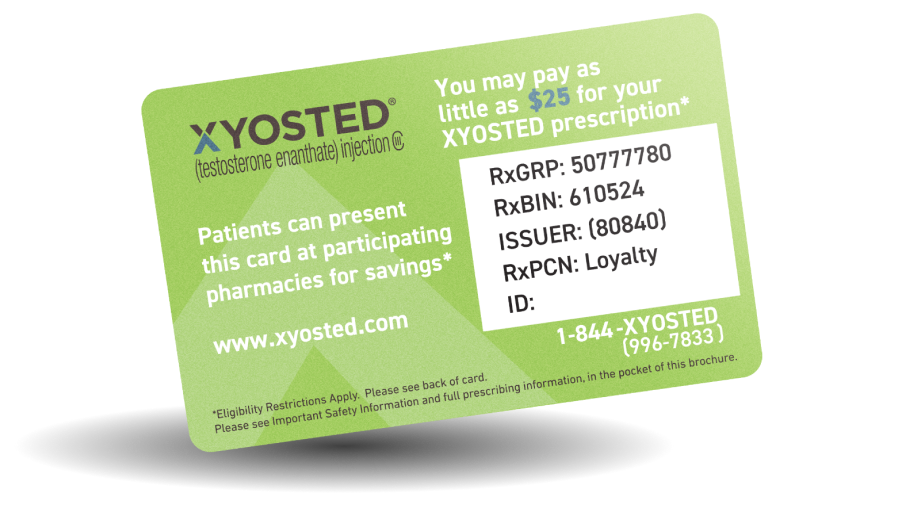XYOSTED® (testosterone enanthate) injection, for subcutaneous use CIII
XYOSTED INDICATIONS AND USAGE
XYOSTED (testosterone enanthate) injection is an androgen indicated for testosterone replacement therapy in adult males for conditions associated with a deficiency or absence of endogenous testosterone.
- Primary hypogonadism (congenital or acquired)
- Hypogonadotropic hypogonadism (congenital or acquired)
LIMITATIONS OF USE
- Safety and efficacy of XYOSTED in men with “age-related hypogonadism” has not been established
- Safety and efficacy of XYOSTED in males less than 18 years old have not been established
IMPORTANT SAFETY INFORMATION
CONTRAINDICATIONS
XYOSTED is contraindicated in:
- Men with carcinoma of the breast or known or suspected carcinoma of the prostate.
- Women who are pregnant. Testosterone can cause virilization of the female fetus when administered to a pregnant woman.
- Men with known hypersensitivity to XYOSTED or any of its ingredients (testosterone enanthate and sesame oil).
WARNINGS AND PRECAUTIONS
Polycythemia—Increases in hematocrit, reflective of increases in red blood cell mass, may require discontinuation of XYOSTED. Check that hematocrit is not elevated prior to initiating XYOSTED. Evaluate hematocrit approximately every 3 months while the patient is on XYOSTED. If hematocrit becomes elevated, stop XYOSTED until the hematocrit decreases to an acceptable level. If XYOSTED is restarted and again causes hematocrit to become elevated, stop XYOSTED permanently. An increase in red blood cell mass may increase the risk of thromboembolic events.
Venous Thromboembolism (VTE)—There have been post-marketing reports of venous thromboembolic events, including deep vein thrombosis (DVT) and pulmonary embolism (PE), in patients using testosterone products, such as XYOSTED.
In the Testosterone Replacement therapy for Assessment of long-term Vascular Events and efficacy ResponSE in hypogonadal men (TRAVERSE) Study, a randomized, double-blind, placebo-controlled, cardiovascular (CV) outcomes study, compared to placebo, topical testosterone gel was associated with a higher risk of VTE (1.7% vs 1.2%) which included DVT (0.6% vs 0.5%) and PE (0.9% vs 0.5%).
Evaluate patients who report symptoms of pain, edema, warmth and erythema in the lower extremity for DVT and those who present with acute shortness of breath for PE. If a venous thromboembolic event is suspected, discontinue treatment with XYOSTED and initiate appropriate workup and management.
Worsening of Benign Prostatic Hyperplasia (BPH) and Potential Risk of Prostate Cancer—Patients with BPH treated with androgens are at an increased risk of worsening of signs and symptoms of BPH. Monitor patients with BPH for worsening signs and symptoms. Patients treated with androgens may be at an increased risk for prostate cancer. Evaluate patients for prostate cancer prior to initiating and during treatment with androgens.
Blood Pressure Increase—XYOSTED can increase blood pressure. Ambulatory blood pressure monitoring (ABPM) demonstrated XYOSTED increased systolic/diastolic BP by an average of 3.9/1.5 mmHg from baseline after 12 weeks of treatment in clinical trials. In patients with hypertension on antihypertensive therapy, XYOSTED increased the mean systolic/diastolic BP by 3.9/1.3 mm Hg from baseline.
The CV risk associated with topical testosterone gel was evaluated in TRAVERSE, a randomized, double-blind, placebo-controlled, CV outcomes study in men with a history of CV disease or multiple CV risk factors. In TRAVERSE, topical testosterone gel increased mean systolic blood pressure by 1.8 mmHg from baseline. However, the incidences of major adverse cardiovascular events (MACE), including cardiovascular death, non-fatal myocardial infarction [MI] and non-fatal stroke, were similar between treatment groups (7% for topical testosterone gel vs 7.3% for placebo).
Monitor blood pressure periodically in men using XYOSTED, especially men with hypertension. XYOSTED is not recommended for use in patients with uncontrolled hypertension.
Abuse of Testosterone and Monitoring of Serum Testosterone Concentrations—Testosterone has been subject to abuse, typically at doses higher than recommended for the approved indication and in combination with other anabolic androgenic steroids. Anabolic androgenic steroid abuse can lead to serious cardiovascular and psychiatric adverse reactions.
If testosterone abuse is suspected, check serum testosterone concentrations to ensure they are within therapeutic range. However, testosterone levels may be in the normal or subnormal range in men abusing synthetic testosterone derivatives. Counsel patients concerning the serious adverse reactions associated with abuse of testosterone and anabolic androgenic steroids. Conversely, consider the possibility of testosterone and anabolic androgenic steroid abuse in suspected patients who present with serious cardiovascular or psychiatric adverse events.
Not for Use in Women—Due to lack of controlled studies in women and potential virilizing effects, XYOSTED is not indicated for use in women.
Potential for Adverse Effects on Spermatogenesis—With large doses of exogenous androgens, including XYOSTED, spermatogenesis may be suppressed through feedback inhibition of pituitary follicle-stimulating hormone (FSH) which could possibly lead to adverse effects on semen parameters including sperm count. Patients should be informed of this possible risk when deciding whether to use or to continue to use XYOSTED.
Hepatic Adverse Effects—Prolonged use of high doses of orally active 17-alpha-alkyl androgens (e.g., methyltestosterone) has been associated with serious hepatic adverse effects (peliosis hepatis, hepatic neoplasms, cholestatic hepatitis, and jaundice). Peliosis hepatis can be a life-threatening or fatal complication. Long-term therapy with intramuscular testosterone enanthate, which elevates blood levels for prolonged periods, has produced multiple hepatic adenomas. XYOSTED is not known to produce these adverse effects. Nonetheless, patients should be instructed to report any signs or symptoms of hepatic dysfunction (e.g., jaundice). If these occur, promptly discontinue XYOSTED while the cause is evaluated.
Edema—Androgens, including XYOSTED, may promote retention of sodium and water. Edema with or without congestive heart failure may be a serious complication in patients with preexisting cardiac, renal, or hepatic disease. In addition to discontinuation of the drug, diuretic therapy may be required.
Gynecomastia—Gynecomastia may develop and may persist in patients being treated for hypogonadism.
Sleep Apnea—Treatment with testosterone products, including XYOSTED, may potentiate sleep apnea in some patients, especially those with risk factors such as obesity or chronic lung disease.
Lipid Changes—Changes in the serum lipid profile may require dose adjustment of lipid lowering drugs or discontinuation of testosterone therapy. Monitor the lipid profile periodically, particularly after starting testosterone therapy.
Hypercalcemia—Androgens, including XYOSTED, should be used with caution in cancer patients at risk of hypercalcemia (and associated hypercalciuria). Monitor serum calcium concentrations regularly during treatment with XYOSTED in these patients.
Decreased Thyroxine-binding Globulin—Androgens, including XYOSTED, may decrease concentrations of thyroxine-binding globulin, resulting in decreased total T4 serum concentrations and increased resin uptake of T3 and T4. Free thyroid hormone concentrations remain unchanged, however, and there is no clinical evidence of thyroid dysfunction.
Risk of Depression and Suicide—Depression and suicidal ideation and behavior, including completed suicide, have occurred during clinical trials in patients treated with XYOSTED. Advise patients and caregivers to seek medical attention for manifestations of suicidal ideation or behavior, new onset or worsening depression, anxiety, or other mood changes.
ADVERSE REACTIONS
The safety of XYOSTED was evaluated in 2 clinical studies in a total of 283 men who received weekly subcutaneous doses for up to 1 year. All patients were started on 75 mg weekly, then the dose was titrated to 50 mg or 100 mg weekly, as needed, to achieve pre-dose total testosterone concentrations of ≥350 ng/dL and <650 ng/dL.
The most commonly reported adverse reactions (>5%) were: hematocrit increased, hypertension, PSA increased, injection site bruising, and headache.
DRUG INTERACTIONS
Insulin—Changes in insulin sensitivity or glycemic control may occur in patients treated with androgens. In diabetic patients, the metabolic effects of androgens may decrease blood glucose and, therefore, may necessitate a decrease in the dose of anti-diabetic medication.
Oral Anticoagulants—Changes in anticoagulant activity may be seen with androgens, therefore, more frequent monitoring of international normalized ratio (INR) and prothrombin time are recommended in patients taking warfarin, especially at the initiation and termination of androgen therapy.
Corticosteroids—The concurrent use of testosterone with corticosteroids may result in increased fluid retention and requires careful monitoring, particularly in patients with cardiac, renal or hepatic disease.
Medications that May Also Increase Blood Pressure—Some prescription medications and nonprescription analgesic and cold medications contain drugs known to increase blood pressure. Concomitant administration of these medications with XYOSTED may lead to additional increases in blood pressure.
USE IN SPECIFIC POPULATIONS
Pregnancy—XYOSTED is contraindicated in pregnant women. Testosterone is teratogenic and may cause fetal harm when administered to a pregnant woman based on data from animal studies and its mechanism of action. Exposure of a female fetus to androgens may result in varying degrees of virilization. In animal developmental studies, exposure to testosterone in utero resulted in hormonal and behavioral changes in offspring and structural impairments of reproductive tissues in female and male offspring. These studies did not meet current standards for nonclinical development toxicity studies.
Lactation—XYOSTED is not indicated for use in females.
Females and Males of Reproductive Potential - During treatment with large doses of exogenous androgens, including XYOSTED, spermatogenesis may be suppressed through feedback inhibition of the hypothalamic-pituitary-testicular axis. Reduced fertility is observed in some men taking testosterone replacement therapy. The impact on fertility may be irreversible.
Pediatric Use—Safety and effectiveness of XYOSTED in pediatric patients less than 18 years old have not been established. Improper use may result in acceleration of bone age and premature closure of epiphyses.
Geriatric Use—There have not been sufficient numbers of geriatric patients in controlled clinical studies with XYOSTED to determine whether efficacy or safety in those over 65 years of age differs from younger subjects. Of the 283 patients enrolled in the 6-month and 1-year efficacy and safety clinical study utilizing XYOSTED, 49 (17%) were over 65 years of age. Additionally, there are insufficient long-term safety data in geriatric patients to assess the potentially increased risk of cardiovascular disease and prostate cancer. Geriatric patients treated with androgens may also be at risk for worsening of signs and symptoms of BPH.
DRUG ABUSE AND DEPENDENCE
XYOSTED contains testosterone enanthate, a Schedule III controlled substance in the Controlled Substances Act.
Abuse and misuse of testosterone are seen in male and female adults and adolescents. Testosterone, often in combination with other anabolic androgenic steroids, may be abused by athletes and bodybuilders.
Serious adverse reactions have been reported in individuals who abuse anabolic androgenic steroids, and include cardiac arrest, myocardial infarction, hypertrophic cardiomyopathy, congestive heart failure, cerebrovascular accident, hepatotoxicity, and serious psychiatric manifestations, including major depression, mania, paranoia, psychosis, delusions, hallucinations, hostility, and aggression.
The following adverse reactions have been reported in men: transient ischemic attacks, convulsions, hypomania, irritability, dyslipidemia, testicular atrophy, subfertility, and infertility.
The following adverse reactions have been reported in women: hirsutism, virilization, deepening of voice, clitoral enlargement, breast atrophy, male pattern baldness, and menstrual irregularities.
The following adverse reactions have been reported in male and female adolescents: premature closure of bony epiphyses with termination of growth, and precocious puberty.
Withdrawal symptoms can be experienced upon abrupt discontinuation in patients with addiction. Withdrawal symptoms include depressed mood, major depression, fatigue, craving, restlessness, irritability, anorexia, insomnia, decreased libido, and hypogonadotropic hypogonadism. Drug dependence in individuals using approved doses for approved indications have not been documented.
For more information, call
1-844-XYOSTED (1-844-996-7833).
Please see full Prescribing Information and Medication Guide.
April 2025 Update.


